Jewish History as Family History
The upcoming Hadassah convention in Atlanta and a recent Midwest road trip have reminded me of why we say l’dor vador, from generation to generation.
Hadassah, the Zionist Women’s Organization of America, will hold its 98th national convention in Buckhead from July 25 to 28. The host chapter, Greater Atlanta Hadassah, is marking its centennial this year. (Look for a convention preview and centennial celebration in the July 22 AJT.)
The founding meeting of Hadassah was held after Shabbat on Feb. 24, 1912, in the vestry room of Temple Emanu-El in New York.
Get The AJT Newsletter by email and never miss our top stories Free Sign Up
“The undersigned have decided that the time is ripe for a large organization of women Zionists,” reads the invitation bearing seven names.
The undersigned included Henrietta Szold, the driving force behind Hadassah, and her friend Mathilde Schechter, my paternal great-grandmother.
Hadassah, the Hebrew name of Queen Esther, was chosen because the meeting was held one week before Purim.
As president, Szold presided at Hadassah’s first board meeting April 4, 1912. Mathilde, who became its national chairwoman for education, hosted that gathering at her home in the Morningside Heights neighborhood of Manhattan.
What began as three dozen members of the Hadassah chapter of the National Daughters of Zion has grown to 330,000 members nationally, supporting projects in Israel and the United States. The Atlanta chapter, founded Nov. 2, 1916, with 18 members, today has more than 3,600.
The road trip further reminded me of how families become linked over time.
More than 30 years ago I married into a family with its own history, its own family tree to learn, and its own stories passed from one generation to the next.
The first time we met, my wife’s paternal grandmother, Rose Galex, insisted that henceforth I call her “Sugie.”
A small woman with silver hair whose fortitude was not to be underestimated, Sugie had immigrated to the United States as a girl from Ukraine, from the town of Narodychi. Sugie and her husband, Wilbur, built a mattress company that moved west from Chicago to Rock Island, Ill., along the Mississippi River.
Early in my courtship I was amazed to learn that the first time my future father-in-law made a solo truck delivery to Des Moines, Iowa, it was to a furniture store operated by Uncle Harry, my maternal grandfather’s twin brother.
Sugie passed away in January 1998, 10 months before our youngest was born. That boy is now 17 and a high school senior.
He and I recently drove from Atlanta to Iowa so that he could tour my alma mater. From there we headed east to Rock Island. My wife flew in to show him the sights and tastes of her hometown.
On a warm day, with few clouds in the sky, we went to the Hebrew Cemetery.
My wife sat for a while next to Sugie’s grave. Later, as we walked in the cemetery and she pointed out the markers of people she knew as a child, our son stood for a long time before the grave of the great-grandmother he never knew.
My wife returned to Atlanta, and my son and I drove to Chicago to visit my mother. An unplanned addition there would be the funeral of my sister’s father-in-law.
When your siblings marry, other families come into your orbit. Pete Schmelkin was my brother-in-law’s father.
Pete was proud of his service with the U.S. Army in Germany in the early 1950s, and his funeral included a ceremony conducted by his comrades from the Jewish War Veterans, Post 153.
My brother-in-law spoke, as did Pete’s four grandchildren. The religious service was officiated by the oldest grandchild’s wife, who recently was ordained as a rabbi, and by my brother, a rabbi of many years, who flew in at our sister’s request.
As my father used to say, we are a full-service family.
The legacies of Mathilde, Rose and Pete extend well beyond organizations and businesses to families that have become linked over the years, with children benefiting today from the foundations they laid many years ago.
L’dor vador, from generation to generation.






comments